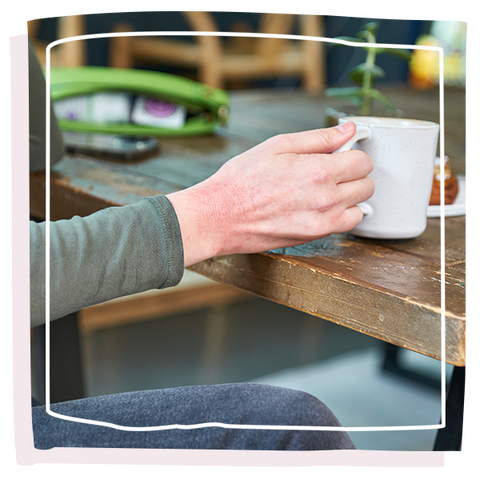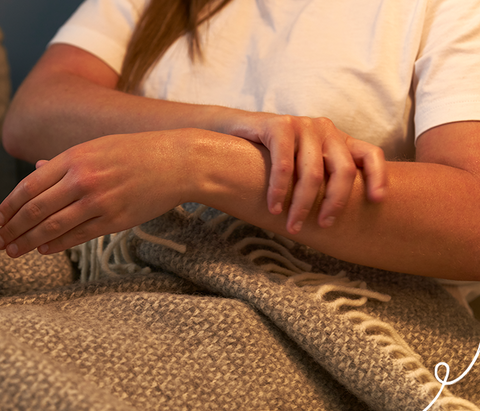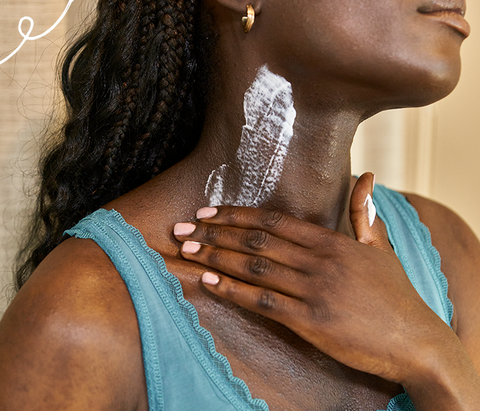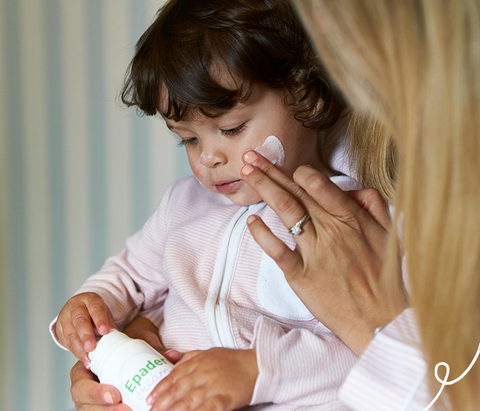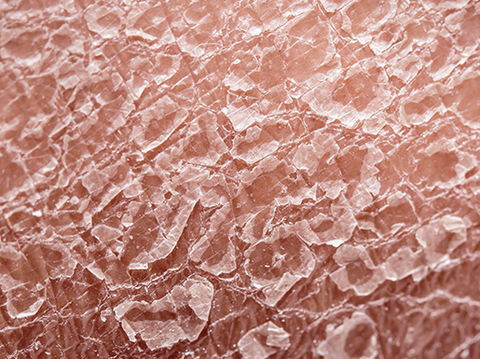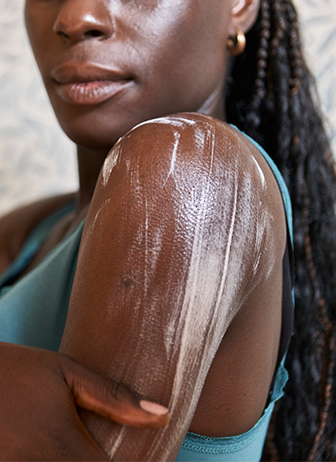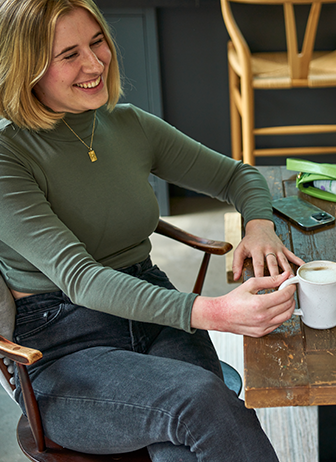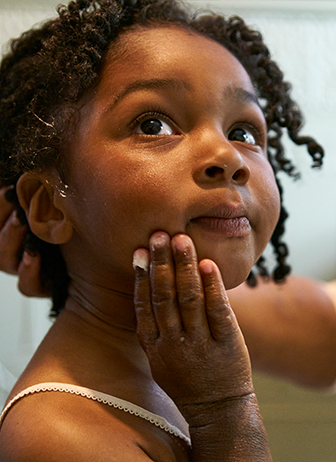An Introduction to Eczema
In the UK, 1 in 10 adults¹ and 1 in 5 children² have Eczema - if you don’t have it yourself, chances are you know someone who does! Even though it’s so common, there are still a fair few questions on what causes Eczema, how to treat it and in some cases, how to prevent it. So here’s Eczema, explained by Epaderm.
What is Eczema?
The word Eczema itself comes from the Greek word ‘to boil’ – and that pretty much sums up the effects Eczema has on your skin! There are varying levels, but it’s essentially is an inflammation of the skin that makes it red, dry and infuriatingly itchy³.
As mentioned, it’s really common for children, often popping up before their first birthday, and can remain into adulthood. In some cases, it can appear when you are an adult too. So while some people grow out of it, for a lot of us, Eczema is a companion for life or a new skin condition.⁴
Did you know…?
Eczema and dermatitis are the same thing! It’s just named differently at different times due to the longevity of the skin condition or the trigger.⁵
What does Eczema look like?
It appears in patches all over the skin or in certain areas, and the affected skin is usually very red and dry. Because it itches so much, you can often see it surrounded by scratch marks and bleeding – and it can become thicker, darker or lighter than other areas of the skin. When it’s at its most active (aka flared), it can become moist or weep fluid from small water blisters on the surface of the skin.
There’s nowhere on the body Eczema won’t go, but you’ll most commonly see it at the joint creases at the elbows and knees, or around the wrists and neck.⁶
As well as these forms, there are other types of Eczema associated with specific areas of the body, including the face, hands, eyes, ears, scalp and genitals.⁹
What causes Eczema?
With Atopic Eczema, there aren’t just causes, but triggers that can cause it to wake up again, if even it’s been asleep for a while.
First of all, it’s often hereditary – so if at least one of your parents has it, you’re more likely to develop it.
As we mentioned before, it’s also linked to hayfever and asthma and food allergies. So you’ll find that if you have any of these things, Eczema often comes as part of the package (a third of children with Eczema will develop asthma or hayfever too.)¹⁰
Overall, the main cause is an alteration in the gene that maintains a healthy skin barrier – so your skin struggles to keep hold of the moisture it really needs.¹¹,¹²
When your skin is dry, it’s more likely to react to triggers that can make it itchy and sore. Some of the most common are:
- Irritants like soap, detergent, shampoo, washing-up liquid and bubble bath
- Cold and dry weather or dampness
- Pet fur, pollen and mould
- Food allergies, particularly cows’ milk, eggs, peanuts, soya or wheat
- Certain clothing materials like wool and synthetic fabrics
- Hormonal changes – for women, this is often around their period or during pregnancy
- Skin infections
(Source: NHS)¹³
It might sound like everything is out to get you if you have Eczema, but your GP can work with you to help pinpoint the triggers and find a way to manage this.
One of the most important things to remember is Eczema is not contagious! This is a really common myth, but it’s impossible to pass it on to another person or a different part of your own body.
What are the symptoms of Eczema?
The main symptoms are those we mentioned above – inflamed skin that gets very red, dry and itchy.
It can be easy for people to dismiss itching as a symptom, but its impact on people with Eczema should never be underestimated. It can cause problems with sleep, stop you from concentrating and can be triggered psychologically or by even the lightest touch. And even more annoyingly, it’s a different type of itch to those associated with insect bites – so you can’t even get a bit of relief from an antihistamine.¹⁴
The itch-scratch Eczema cycle can also occasionally lead to skin infections, so keep an eye out for fluid, a yellow crust on the skin, Eczema suddenly getting worse, or feeling hot, shivery or unwell – these are all signs of infection and would need a little help from a doctor.¹⁵
How can you treat Eczema?
The good news is that there a variety of different methods of Eczema treatment, ranging from daily moisturising and topical steroid creams right up to oral steroids, paste bandages or immunosuppressants.
Doctors will always take a stepped approach, so if you do think you have Eczema, make an appointment with your GP. They’ll take a look at your skin and ask you questions about your symptoms, other conditions, diet, lifestyle and whether it runs in the family, and will create a plan of action from there.¹⁶
When it comes to how to treat Eczema, an emollient is a good place to start – it’s usually one of the first steps recommended by your doctor. Using a moisturiser like this every day helps stop the skin drying out, and there are a number of different options.
Very dry skin could be more receptive to an ointment; a cream or lotion is better for less dry skin; and it can also be helpful to use an emollient instead of soap¹⁷. Epaderm is a great emollient option and is available in a cream and an ointment for different types of Eczema, different parts of the body and different preferences.
How can you prevent Eczema?
Prevention isn’t about how to cure Eczema or how to get rid of Eczema, because unfortunately, there isn’t a magic pill you can take or cream you can use to make it disappear forever.
However, there are lots of different ways you can manage it, treat it and make sure it never gets in the way of everything you want to do.
Moisturising is always important, so having a pot with you when you’re out and about is really helpful, just in case of a flare-up. Understanding what the triggers are is really helpful too, so then you can avoid these as much as possible. And while we know it’s definitely easier said than done, it helps to reduce scratching as much as possible.
Here are a few top tips that you might find useful:
- Keep your nails short and make sure there are no jagged edges.
- Use Epaderm or your chosen emollient regularly in smooth, downward strokes.
- Make your bed with cotton sheets and blankets and a lighter duvet so you don’t get too hot and scratch in the night.
- Try substituting another action for scratching, like clenching your fists or counting to 10.
- It can help to place your emollient in the fridge for a cooling effect on the skin.
(Source: National Eczema Society.¹⁸)
And here’s a top tip for partners, parents or friends of people with Eczema – don’t tell them not to scratch! We all know this probably isn’t the best thing to do, but it can make them feel even more stressed that the itch.¹⁹
Find out more about Eczema
So that’s Eczema, explained! If you need more help with identifying, treating or managing it, there’s so much more information out there for you – here are a few resources you might find useful:
- NHS: https://www.nhs.uk/conditions/atopic-Eczema/
- British Skin Foundation: https://knowyourskin.britishskinfoundation.org.uk/condition/Eczema/
- Allergy UK: https://www.allergyuk.org/types-of-allergies/Eczema/
- The National Eczema Society: https://Eczema.org/
Their site is packed with information and has a variety of downloadable leaflets on different aspects of the condition.
More Skin Conditions
Epaderm Library
Our website is jam-packed full of useful information from our skin blogs, user case studies to our in-depth FAQs. Discover more by clicking on the relevant section!References
¹ https://eczema.org/information-and-advice/types-of-eczema/
³ https://knowyourskin.britishskinfoundation.org.uk/condition/eczema/
⁴ https://www.nhs.uk/conditions/atopic-eczema/
⁵ https://eczema.org/information-and-advice/types-of-eczema/
⁶ https://knowyourskin.britishskinfoundation.org.uk/condition/eczema/
⁷ https://knowyourskin.britishskinfoundation.org.uk/condition/eczema/
⁸ https://www.nhs.uk/conditions/atopic-eczema/
⁹ https://eczema.org/information-and-advice/types-of-eczema/
¹⁰ https://knowyourskin.britishskinfoundation.org.uk/condition/eczema/
¹¹ https://www.nhs.uk/conditions/atopic-eczema/
¹² https://knowyourskin.britishskinfoundation.org.uk/condition/eczema/
¹³ https://www.nhs.uk/conditions/atopic-eczema/
¹⁴ https://eczema.org/information-and-advice/living-with-eczema/itching-and-scratching/
¹⁵ https://www.nhs.uk/conditions/atopic-eczema/
¹⁶ https://www.nhs.uk/conditions/atopic-eczema/
¹⁷ https://www.nhs.uk/conditions/atopic-eczema/
¹⁸ https://eczema.org/information-and-advice/living-with-eczema/itching-and-scratching/
¹⁹ https://eczema.org/information-and-advice/living-with-eczema/itching-and-scratching/





